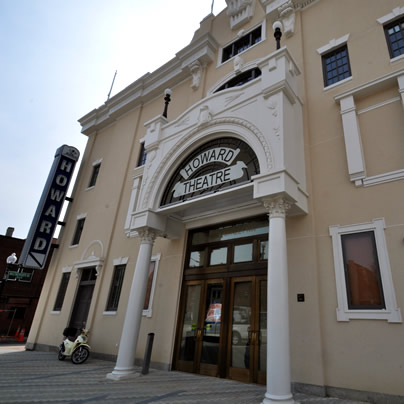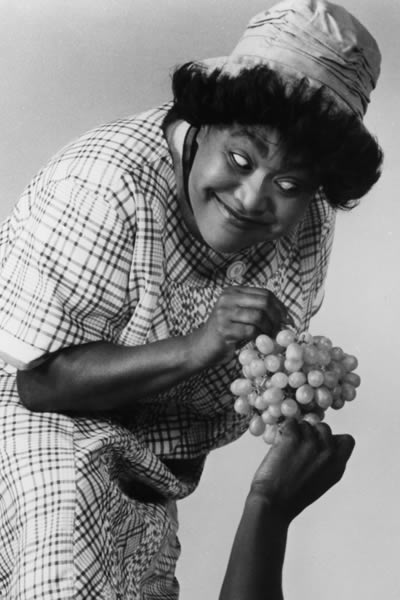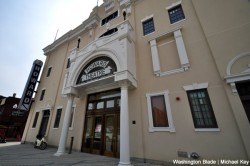Arts & Entertainment
Howard Theatre to host first queer party in 60 years
Pride event recalls ‘Moms’ Mabley’s decadent 1940s celebration


After her after-party was raided by police, Jackie ‘Moms’ Mabley reportedly kept her ‘hen party’ going at the Howard Theatre. (Blade file photo)
Back in the 1940s, when an after party for a “Moms” Mabley show was raided by police at a nightclub owned by D.C.’s “female Al Capone,” Odessa Madre, the attendees weren’t ready to go home, so they kept their decadent queer party going at the Howard Theatre.
At least that’s what Marc Powers, director of marketing for the Howard Theatre, has gathered from accounts from those who knew Jackie “Moms” Mabley, and those who were part of the Howard Theatre community in its heyday.
“Moms Mabley played the Howard Theater,” Powers said. “When that got shut down they were like ‘damn, where are we going to go? Might as well just go back to the Howard!’”
More than 60 years later, the theater will host its first official LGBT event when Brightest Young Things and Capital Pride present WildLife, featuring a queer lineup, including recording artist and New York City personality Amanda Lepore, JD Samson of Le Tigre and MEN, Natty Boom and more. The party is set for Friday, 9 p.m.-3:30 a.m. Tickets are $20 in advance and $25 at the door. Visit dcpride2012.eventbrite.com for more information.
“Now it’s not happening under the cloak of the night,” Powers says about the difference between Mabley’s impromptu “girls party” and Friday’s Pride party. “It’s being advertised in the Blade and City Paper and the Washington Post.”
“This is very much our history as well, here at the Howard,” said John Marble of Brightest Young Things about the lesser-known gay stories that dot the 101-year history of the theater.

The Howard Theatre’s director of marketing is interested in unearthing more of the gay history of the recently restored landmark.
The story of the Howard Theatre’s long lost gay party is almost too fantastic. Because the party was unofficial, there was no written record. Powers said it’s an important part of the recently restored theater’s distinguished history. D.C.’s most notorious madam treating her good friend — a top comic who confirmed suspicions she was a lesbian before she died — to a smorgasbord of her favorite things.
It was fitting that the first artist to play the Howard Theatre for its third grand re-opening on April 13 was black lesbian comic Wanda Sykes, echoing Mabley’s last live performance on April 17, 1975 at the second grand re-opening of the theater weeks before her death.
Though Mabley was not closeted, she wasn’t known as a lesbian to most of her fans, as her onstage persona was quite the opposite. But off-stage, Mabley was known as a pioneer, dressing androgynously and appearing in drag in movies like “The Emperor Jones.”
The assumed original location of the party, Madre’s flagship “Jill Joint” — a nickname for an establishment that trafficked in illegal gambling, drugs, liquor and prostitution — the “Club Madre” was located at 2204 14th St., N.W., the site of the new Mova lounge.
“The club offered liquor by the shot, numbers by the book and girls by the hour,” The Washington Post published in a 1980 piece on Madre. “The late comedienne Jackie ‘Moms’ Mabley performed there free, spending her days in Washington as Odessa’s guest. The two became like sisters.”
“We’re talking about a three-decade relationship, here,” Powers said of the companionship that Madre and Mabley shared from the 1940s through the 1970s.
Though unrecorded until now, Powers said that it’s important to recover and preserve the gay history of the historic Howard Theatre as well, and the connection with Mabley/Madre as well as Duke Ellington’s writing partner Billy Strayhorn, another notable gay character in Howard’s history.
“We don’t know if Madre was at ‘the Madre’ at the time,” Powers said of the after-party, which Powers described as a “hen party.” “She had rooms, clubs, and restaurants all over the city. …She had moving, rotating circles. But Odessa was the host of the party.”
After the club was shut down, Mabley was not interested in going to bed.
“She always keeps the party going,” Powers said. “She’s notorious for that.”
Powers said, according to accounts, it was Mabley herself who was able to secure the key in the middle of the night.
“She gets the key somehow — maybe from a night manager — and has the party upstairs in the Howard Theatre’s balcony,” Powers said.
Photos
PHOTOS: Montgomery County Pride in the Plaza
LGBTQ celebration held in downtown Silver Spring

Montgomery County Pride in the Plaza was held on Sunday, June 29 at Veterans Plaza in Silver Spring, Md.
(Washington Blade photos by Michael Key)























The fifth annual Fredericksburg Pride march and festival was held on Saturday, June 28. A march through the streets of downtown Fredericksburg, Va. was followed by a festival at Riverfront Park.
(Washington Blade photos by Michael Key)



















India
Anaya Bangar challenges ban on trans women in female cricket teams
Former Indian cricketer Sanjay Bangar’s daughter has received support

Anaya Bangar, the daughter of former Indian cricketer Sanjay Bangar, has partnered with the Manchester Metropolitan University Institute of Sport in the U.K. to assess her physiological profile following her gender-affirming surgery and undergoing hormone replacement therapy.
From January to March 2025, the 23-year-old underwent an eight-week research project that measured her glucose levels, oxygen uptake, muscle mass, strength, and endurance after extensive training.
The results, shared via Instagram, revealed her metrics align with those of cisgender female athletes, positioning her as eligible for women’s cricket under current scientific standards. Bangar’s findings challenge the International Cricket Council’s 2023 ban on transgender athletes in women’s cricket, prompting her to call for a science-based dialogue with the Board of Control for Cricket in India and the ICC to reform policies for transgender inclusion.
“I am talking with scientific evidence in my hand,” Bangar said in an interview posted to her Instagram page. “So, I hope, this makes an impact and I will be hoping to BCCI and ICC talking with me and discussing this further.”
On Nov. 21, 2023, the ICC enacted a controversial policy barring trans women from international women’s cricket. Finalized after a board meeting in Ahmedabad, India, the regulation prohibits any trans player who has experienced male puberty from competing, irrespective of gender-affirming surgery or hormone therapy. Developed through a 9-month consultation led by the ICC’s Medical Advisory Committee, the rule aims to safeguard the “integrity, safety, and fairness” of women’s cricket but has drawn criticism for excluding athletes like Canada’s Danielle McGahey, the first trans woman to play internationally. The policy, which allows domestic boards to set their own rules, is slated for review by November 2025.
Bangar shared a document on social media verifying her participation in a physiological study at the Manchester Metropolitan University Institute of Sport, conducted from Jan. 20 to March 3, 2025, focused on cricket performance. The report confirmed that her vital metrics — including haemoglobin, blood glucose, peak power, and mean power — aligned with those of cisgender female athletes. Initially, her fasting blood glucose measured 6.1 mmol/L, slightly above the typical non-diabetic range of 4.0–5.9 mmol/L, but subsequent tests showed it normalized, reinforcing the study’s findings that her physical profile meets female athletic standards.
“I am submitting this to the BCCI and ICC, with full transparency and hope,” said Bangar. “My only intention is to start a conversation based on facts not fear. To build space, not divide it.”
In a letter to the BCCI and the ICC, Bangar emphasized her test results from the Manchester Metropolitan University study. She explained that the research aimed to assess how hormone therapy had influenced her strength, stamina, haemoglobin, glucose levels, and overall performance, benchmarked directly against cisgender female athletic standards.
Bangar’s letter to the BCCI and the ICC clarified the Manchester study was not intended as a political statement but as a catalyst for a science-driven dialogue on fairness and inclusion in cricket. She emphasized the importance of prioritizing empirical data over assumptions to shape equitable policies for trans athletes in the sport.
Bangar urged the BCCI, the world’s most influential cricket authority, to initiate a formal dialogue on trans women’s inclusion in women’s cricket, rooted in medical science, performance metrics, and ethical fairness. She called for the exploration of eligibility pathways based on sport-specific criteria, such as haemoglobin thresholds, testosterone suppression timelines, and standardized performance testing. Additionally, she advocated for collaboration with experts, athletes, and legal advisors to develop policies that balance inclusivity with competitive integrity.
“I am releasing my report and story publicly not for sympathy, but for truth. Because inclusion does not mean ignoring fairness, it means measuring it, transparently and responsibly,” said Bangar in a letter to the BCCI. “I would deeply appreciate the opportunity to meet with you or a representative of the BCCI or ICC to present my findings, discuss possible policy pathways, and work towards a future where every athlete is evaluated based on real data, not outdated perceptions.”
Before her transition, Bangar competed for Islam Gymkhana in Mumbai and Hinckley Cricket Club in the U.K., showcasing her talent in domestic cricket circuits. Her father, Sanjay Bangar, was a dependable all-rounder for the Indian national cricket team from 2001 to 2004, playing 12 test matches and 15 One Day Internationals. He later served as a batting coach for the Indian team from 2014 to 2019, contributing to its strategic development.
Cricket in India is a cultural phenomenon, commanding a fanbase of more than 1 billion, with more than 80 percent of global cricket viewership originating from the country.
The International Cricket Council, the sport’s governing body, oversees 12 full member nations and more than 90 associate members, with the U.S. recently gaining associate member status in 2019 and co-hosting the 2024 ICC Men’s T20 World Cup. The BCCI generated approximately $2.25 billion in revenue in the 2023–24 financial year, primarily from the Indian Premier League, bilateral series, and ICC revenue sharing. The ICC earns over $3 billion from media rights in India alone for the 2024–27 cycle, contributing nearly 90 percent of its global media rights revenue, with the BCCI receiving 38.5 percent of the ICC’s annual earnings, approximately $231 million per year.
Women’s cricket in India enjoys a growing fanbase, with over 300 million viewers for the Women’s Premier League in 2024, making it a significant driver of the sport’s global popularity. The International Cricket Council oversees women’s cricket in 12 full member nations and over 90 associate members, with the U.S. fielding a women’s team since gaining associate status in 2019 and competing in ICC events like the 2024 Women’s T20 World Cup qualifiers. The BCCI invests heavily in women’s cricket, allocating approximately $60 million annually to the WPL and domestic programs in 2024–25, while contributing to the ICC’s $20 million budget for women’s cricket development globally. India’s media market for women’s cricket, including WPL broadcasting rights, generated $120 million in 2024, accounting for over 50 percent of the ICC’s women’s cricket media revenue.
“As a woman, I feel when someone says that they are women, then they are, be trans or cis. A trans woman is definitely the same as a cis woman emotionally and in vitals, and specially, when someone is on hormone replacement therapy. Stopping Anaya Bangar from playing is discrimination and violation of her rights. It is really sad and painful that every transwoman need to fight and prove their identity everywhere,” said Indrani Chakraborty, an LGBTQ rights activist and a mother of a trans woman. “If ICC and BCCI is stopping her from playing for being transgender, then I will say this to be their lack of awareness and of course the social mindsets which deny acceptance.”
Chakraborty told the Blade that Bangar is an asset, no matter what. She said that the women’s cricket team will only benefit by participation, but the discriminating policies are the hindrance.
“Actually the transgender community face such discrimination in every sphere. In spite of being potent, they face rejection. This is highly inhuman. These attitudes is regressive and will never let to prosper. Are we really in 2025?,” said Chakraborty. “We, our mindset and the society are the issues. We, as a whole, need to get aware and have to come together for getting justice for Anaya. If today, we remain silent, the entire community will be oppressed. Proper knowledge of gender issues need to be understood.”
The BCCI and the International Cricket Council have not responded to the Blade’s repeated requests for comment.
-

 U.S. Supreme Court5 days ago
U.S. Supreme Court5 days agoSupreme Court upholds ACA rule that makes PrEP, other preventative care free
-

 U.S. Supreme Court5 days ago
U.S. Supreme Court5 days agoSupreme Court rules parents must have option to opt children out of LGBTQ-specific lessons
-

 Television5 days ago
Television5 days ago‘White Lotus,’ ‘Severance,’ ‘Andor’ lead Dorian TV Awards noms
-

 Music & Concerts5 days ago
Music & Concerts5 days agoBerkshire Choral to commemorate Matthew Shepard’s life












